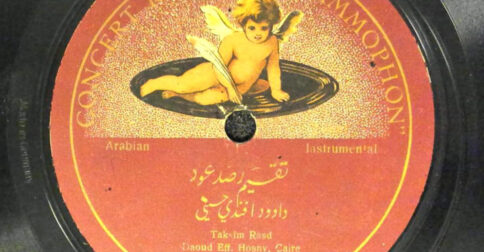
Public Domain Day is not just about the famous works that get released—-this year Milne’s Winnie-the-Pooh and Hemingway’s The Sun Also Rises were the best known-—but the archives that suddenly open up when any potential argument over copyright bypasses its sell-by date.
For example, Harvard’s Loeb Music Library has just released a selection from its 600-volume 78rpm collection of Arab and Arab-American music from the early 20th Century. The Library’s collection spans roughly 1903 to the 1950s and is not just a record of the aesthetics and the time of the Nahdah Era (the Arab Renaissance), but it also serves as a history of the still-young music industry. Among the RCA, Columbia, and Victor labels, you will also find many independent (and bootleg!) labels.
Harvard’s website notes:
Arab record companies, such as Baidaphon and Cairophon, are only a few among many other American (Columbia, Victor), European (Odeon, Orfeon), and Arab-American companies (Al-Chark, Alamphon) that recorded and released these notable Arab voices. Songs and performers from Egypt, Syria, Lebanon, Palestine, Iraq and Al-Maghrib exhibit the rich tradition of Arabic musical forms, namely the art of al-maww?l (vocal improvisation), qa??dah (sung poems), muwashsha? (Andalusian sung poetry), ?aq??qah (pop songs) and taqs?m (instrumental improvisation. Religious chants are also an important piece of the Arabic musical tradition. The collection includes Qur’anic recitation of Al-shaykh ??h? Al-Fashn? and a rare record of a woman reciter Wad?dah Al-Minyalaw? alongside Christian hymns of Father Gigis ?Az?z Al-Jizz?n?.
A selection of recordings are available here for both online listening and download, using the Aviary Platform.
All this is happening due to the Music Modernization Act of 2018, which differs in its public-domain release dates by a few years compared to print and film. According to Citizen DJ, a website we told you about several years ago, “all sound recordings published before January 1, 1923 entered the public domain on January 1, 2022.”
The trick of course is getting access to all of these recordings. The Library of Congress runs a site called The National Jukebox, with access to thousands of 78rpm records from Victor and Columbia labels. That allows you to listen but not download.
The Association for Recorded Sound Collections also has a page noting “Ten Notable Pre-1923 Recordings”, which benefits from its curation. It features important early works like Mamie Smith’s “Crazy Blues,” one of the most popular “race records” (i.e. vocal blues sung by Black performers) of 1920; Enrico Caruso’s “Vesti La Giubba,” which features the tenor at the height of his career; and Vess L. Ossman’s recording of Joplin’s “Maple Leaf Rag,” which helped popularize the composer. Also see our recent post: 400,000+ Sound Recordings Made Before 1923 Have Entered the Public Domain.
Related Content:
The Great Gatsby Is Now in the Public Domain and There’s a New Graphic Novel
Ted Mills is a freelance writer on the arts who currently hosts the Notes from the Shed podcast and is the producer of KCRW’s Curious Coast. You can also follow him on Twitter at @tedmills, and/or watch his films here.
from Open Culture https://ift.tt/6MyCqF1Wa
via Ilumina
Comments
Post a Comment